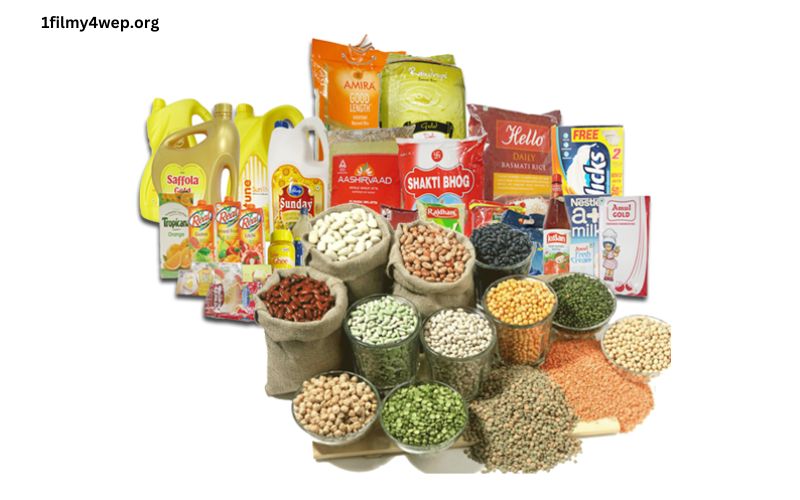Grocery shopping is an essential part of daily life, involving the purchase of various food and household items necessary for sustenance and hygiene. This article provides a comprehensive guide to common grocery items and their prices in English, offering insights into current market trends and helping consumers make informed choices.
Essential Grocery Items
- Rice
- Regular Rice: ₹40-₹60 per kilogram
- Basmati Rice: ₹100-₹200 per kilogram
- Brown Rice: ₹80-₹120 per kilogram
Rice is a staple food in many households, forming the base of numerous dishes. The price of rice varies based on type and quality, with basmati rice generally being more expensive due to its aromatic properties and longer grains.
- Wheat Flour (Atta)
- Regular Wheat Flour: ₹30-₹50 per kilogram
- Multigrain Flour: ₹50-₹70 per kilogram
Wheat flour is another fundamental ingredient, particularly in Indian cuisine, where it is used to make bread, chapatis, and other baked goods. Multigrain flour, which includes a mix of grains, is often slightly more expensive due to its added nutritional benefits.
- Pulses (Dal)
- Tur Dal: ₹80-₹120 per kilogram
- Moong Dal: ₹70-₹100 per kilogram
- Chana Dal: ₹60-₹90 per kilogram
- Urad Dal: ₹90-₹130 per kilogram
Pulses are an important source of protein, especially in vegetarian diets. The prices of various dals can fluctuate based on factors like seasonal availability and crop yield.
- Cooking Oil
- Sunflower Oil: ₹100-₹150 per liter
- Mustard Oil: ₹120-₹180 per liter
- Olive Oil: ₹300-₹500 per liter
Cooking oils are used for frying, sautéing, and as dressings. While sunflower and mustard oils are commonly used in Indian households, olive oil, known for its health benefits, is more expensive.
- Spices
- Turmeric Powder: ₹200-₹300 per kilogram
- Red Chili Powder: ₹300-₹400 per kilogram
- Coriander Powder: ₹200-₹300 per kilogram
- Cumin Seeds: ₹400-₹500 per kilogram
Spices are integral to Indian cooking, adding flavor and aroma to dishes. Prices can vary widely depending on quality and origin.
- Vegetables
- Potatoes: ₹20-₹30 per kilogram
- Tomatoes: ₹30-₹40 per kilogram
- Onions: ₹40-₹60 per kilogram
- Carrots: ₹50-₹70 per kilogram
- Spinach: ₹20-₹30 per bunch
Fresh vegetables are a vital part of a healthy diet. Prices can be highly variable based on season, location, and availability.
- Fruits
- Apples: ₹100-₹200 per kilogram
- Bananas: ₹40-₹60 per dozen
- Oranges: ₹80-₹120 per kilogram
- Mangoes: ₹150-₹250 per kilogram (seasonal)
Fruits provide essential vitamins and minerals. Seasonal fruits like mangoes may have higher prices during their peak season.
- Dairy Products
- Milk: ₹50-₹60 per liter
- Curd (Yogurt): ₹60-₹80 per kilogram
- Paneer (Cottage Cheese): ₹300-₹400 per kilogram
- Butter: ₹450-₹550 per kilogram
Dairy products are a key source of calcium and protein. The prices of these products can be influenced by factors such as brand, fat content, and packaging.
- Eggs and Meat
- Eggs: ₹5-₹7 per egg
- Chicken: ₹200-₹250 per kilogram
- Mutton: ₹600-₹800 per kilogram
- Fish: ₹200-₹500 per kilogram (depending on type)
Proteins from eggs and meat are crucial for a balanced diet. Prices can vary significantly based on the type and quality of the meat.
- Beverages
- Tea: ₹300-₹500 per kilogram
- Coffee: ₹400-₹700 per kilogram
- Soft Drinks: ₹20-₹40 per bottle (300ml)
- Juices: ₹80-₹120 per liter
Beverages, both hot and cold, are enjoyed by people of all ages. Tea and coffee prices depend on the brand and quality, while soft drinks and juices can vary based on packaging and flavors.
- Snacks and Packaged Foods
- Biscuits: ₹20-₹50 per packet
- Chips: ₹20-₹50 per packet
- Instant Noodles: ₹15-₹30 per packet
- Breakfast Cereals: ₹300-₹500 per kilogram
Snacks and packaged foods offer convenience and variety. Prices are often influenced by brand, quantity, and packaging.
Conclusion
In conclusion, understanding the prices of essential grocery items is crucial for effective budgeting and informed decision-making while shopping. This comprehensive guide has provided insights into the prices of common maligai items, ranging from rice and pulses to fruits, vegetables, dairy products, and household essentials. By being aware of prevailing market trends, seasonal variations, and factors influencing prices, consumers can make smart choices to meet their household needs without overspending. Additionally, adopting strategies such as making lists, comparing prices, buying in bulk, and taking advantage of discounts can further enhance the shopping experience and ensure value for money. With this knowledge in hand, individuals can navigate the grocery aisle with confidence, optimizing both their budgets and their overall shopping experience.

